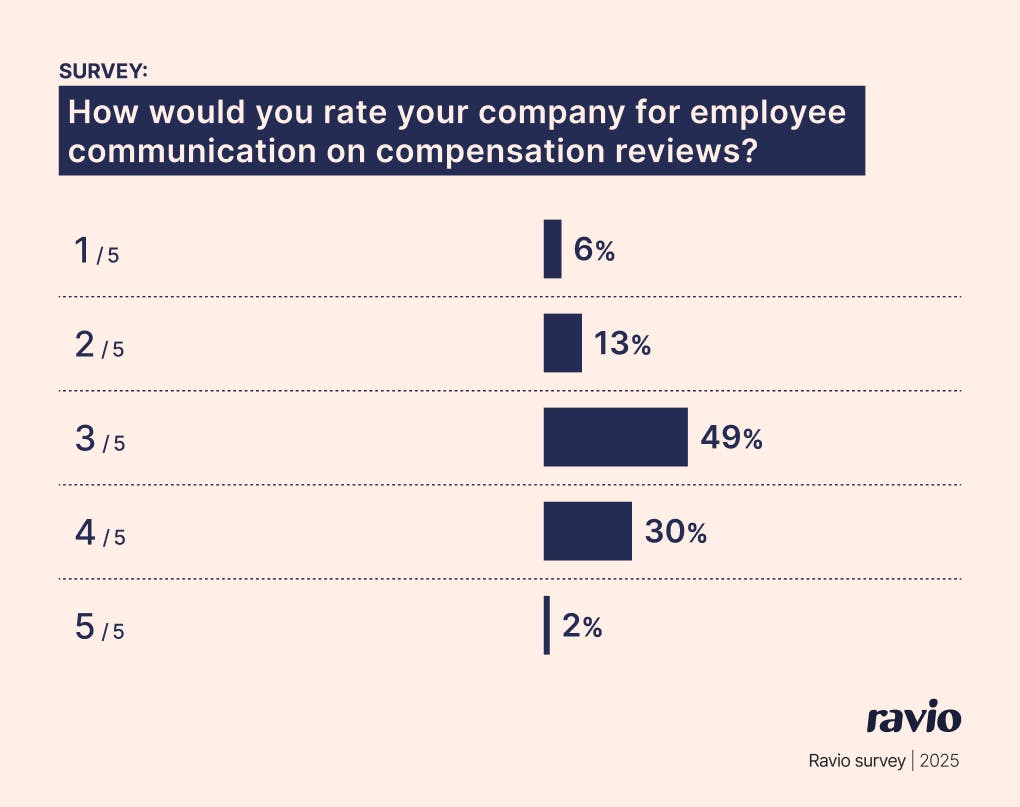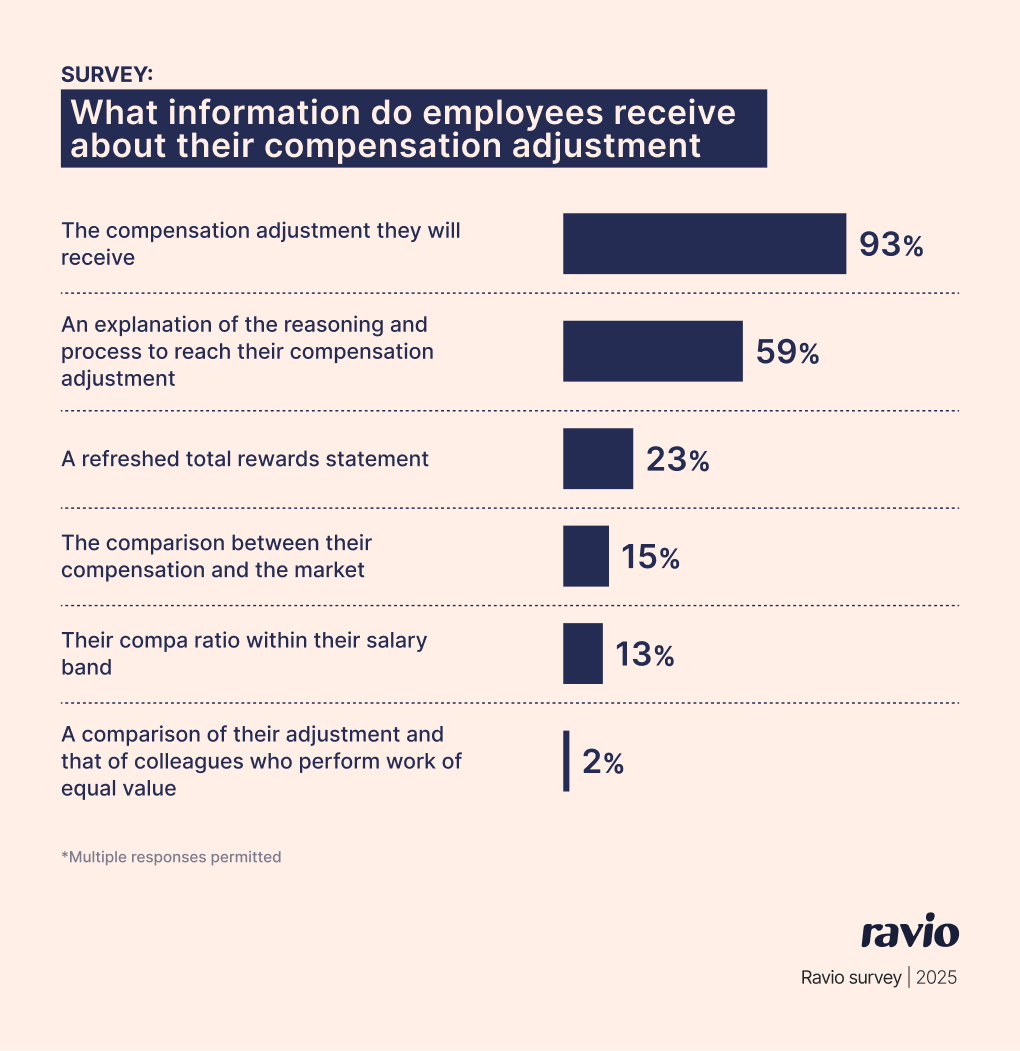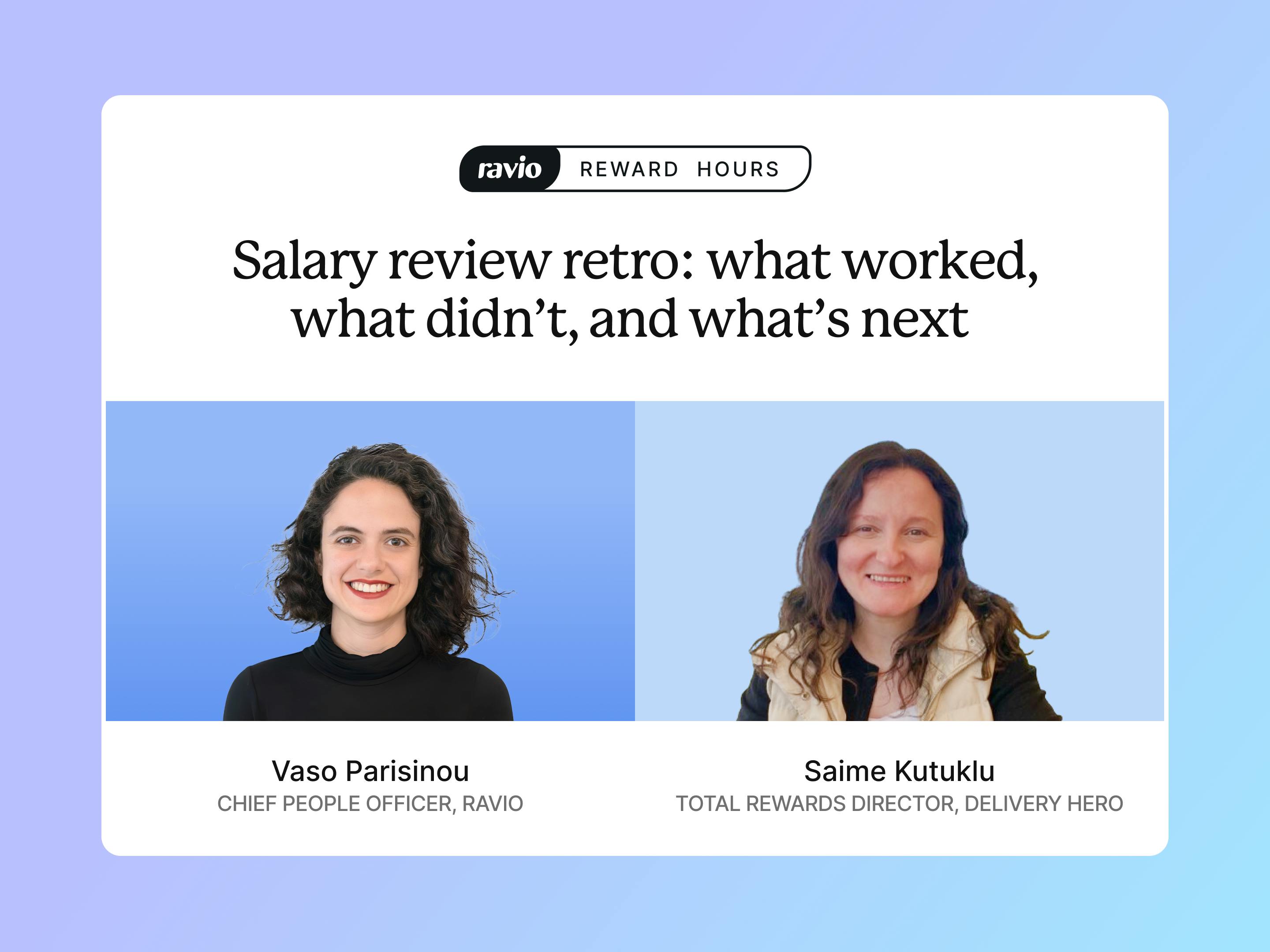Communicating compensation changes during salary review season is a two-part challenge.
There's the centralised communication that HR controls: outlining the process, explaining how decisions are made, and delivering outcomes through formal channels like an updated total rewards statement.
Then there's the one-on-one conversations between managers and employees where the compensation changes are usually first shared – often where disappointment gets voiced, and difficult questions arise.
Our recent survey of 140 teams confirms what most of us already know: employee communications is the part of compensation reviews that HR and Reward teams struggle with the most.
So we asked 11 Reward leaders to share what's actually working at their companies – not the generic "communicate early and often" advice, but the specific tactics, tools, and approaches that are actually making communicating compensation changes less painful.
The data: Employee communication is a weak link in the compensation review process
Employee communication is an area that most teams recognise they're falling short.
In fact, when we asked 140 HR and Reward teams how they rate employee communication for their company’s compensation review process, 68% reported 1-3 out of 5.
Those reporting 5/5 communication ratings emphasised the importance of process clarity, transparency, eliminating surprises in terms of employee outcomes, and dedicating sufficient time to compensation communication plans rather than treating it as an administrative afterthought.
Enterprise teams are particularly struggling with communicating compensation reviews, with a huge 82% of respondents rating their company a 1-3 out of 5 – 21% higher than the overall figure.
Communication is likely trickier with larger and more dispersed teams (perhaps becoming more decentralised as team leads own the communication process), as well as there being more red tape and bureaucracy around internal communication too.
On the other end of the scale, it's actually the 500-1000 employee group that has the strongest employee communications, with 53% rating their communications 4-5.
In terms of what information is shared with employees about their compensation adjustment, most companies share the basics, but not the context.
93% tell employees their compensation adjustment, and 59% also provide rationale for the decision made. Fewer help employees understand their market position (15%), band placement (13%), or pay equity compared to colleagues (2%) – potentially a significant missed opportunity to build understanding and trust.
11 tactics from Reward leaders on what actually works for communicating compensation changes
So what would help improve how we communicate about compensation changes during the review cycle?
We asked 11 Reward leaders to share the tips and tactics that are actually making a difference in their organisations. Here’s what they shared.

1. Partner with L&D for manager coaching (Ariela Dias Sanitá, Rewards Consultant)
Ariela Dias Sanitá, a Rewards professional based in Ireland, discovered that partnering with Learning & Development transformed manager preparation from information-sharing into genuine skill-building.
Her approach involved two training sessions per cycle:
- Before the compensation review: Education on how the company approaches compensation, how we benchmark, how we decide salary increases, and so on.
- After compensation adjustment decisions have been made: A co-owned session with Rewards sharing the overall outcomes and reminding on how decisions have been made, and then L&D taking over for coaching on how to have meaningful conversations about compensation.
“The second session was really where the gold was,” Ariela explains. “Managers knew what salary increases their team were getting and so what kind of conversations they would soon need to have – so it gave managers space to practise and prepare for difficult conversations in a safe environment.”
"This session was never recorded and our L&D specialist would ask questions like 'what is the worst case scenario?', 'what if someone in your team doesn't get a salary increase?', 'how can you prepare to position this decision with confidence?'"
"It was a true coaching session, and we always received great feedback from managers after it."

2. Bookend each cycle with pre-brief and debrief sessions (Matt McFarlane, FNDN)
For Matt McFarlane, Director at FNDN, “a compensation cycle pre-brief and a debrief was a gamechanger.”
The pre-brief session sets employee expectations upfront: timeframes, goals and principles, roles and responsibilities, typical salary increase ranges.
“It worked especially well when I created a comprehensive hub in Notion containing all of the process information, as well as a refresh on our compensation philosophy and a recorded fireside chat with the executive team explaining how the review works.”
"The comms were consistently raved about – people appreciated the lengths we went to to ensure everyone felt informed."
The debrief session then closes the loop. "Out the other side of it, you get to share how you went hitting goals," Matt explains.
As well as ensuring employees have all the context they need, this approach also creates accountability for managers.
When employees understand what the review is aiming to achieve and the 'before' picture of where things stand, it holds managers accountable to making fair and defensible decisions that they'd feel confident communicating to their teams.
"The transparency is a great defence against managers who want to break the rules for their favourites."

3. Sequence communications strategically across multiple touchpoints (Phil Rigby, PwC)
Phil Rigby, in-house Total Rewards Leader at PwC (with previous roles at Telstra, Baker McKenzie, WPP, and oOh!Media), emphasises that effective compensation communication isn't a single event – it's a carefully choreographed sequence.
"One of the most effective ways I've found to deliver remuneration reviews is through a coordinated approach that combines practical manager toolkits with senior business and/or HR-led leader briefings, followed by employee sessions timed to land just before delivery," he explains.
"This sequencing ensures message consistency, builds confidence, and equips leaders to communicate with clarity and impact."
For Phil, the involvement of senior leadership in these communication touchpoints is vital.
When leaders participate in briefings and share their own experiences, "it reinforces transparency, commitment, and trust in the process. Storytelling is particularly powerful here – it adds authenticity and helps others connect with the message."
By the time employees hear about their compensation changes in 1:1s, they've already heard the same core messages through multiple channels and voices – which means no surprises, no confusion, and managers who feel prepared rather than blindsided by questions.
"Remuneration is, after all, as much art as it is science," he explains. "Clear, timely communication translates the technical aspects of design into something people can understand and relate to."
"By treating communication as a core part of the process rather than an afterthought, we lift leader capability, help messages resonate, and position leaders as the key drivers of engagement and connection across their teams."
Subscribe to our newsletter for monthly insights from our compensation dataset and network of experts, to help you navigate a career in Rewards 📩

4. Build compensation understanding well before review season starts (Anzhela Radchenko, Ideals)
For Anzhela Radchenko, Total Rewards Lead at Ideals, effective compensation communication requires preparing employees to receive messages, not just managers to deliver them.
"Preparation for compensation communication starts well before the review cycle. The starting point is clear, transparent, and consistent messaging about the company's compensation philosophy," she explains.
"It's important to understand your audience, so that you can then anticipate what will help employees better receive and trust the message."
This ongoing communication should reinforce:
- What drives pay decisions
- What external factors influence them (market conditions, company performance, strategic priorities)
- How these elements come together in the review process.
"By doing this regularly, you build understanding and credibility over time – so when the compensation review comes around, communication feels like a continuation of an ongoing dialogue, not a surprise announcement."

5. Invest in deep education for managers that goes beyond process checklists (Jaz Chuhan, The Reward Consultant)
Jaz Chuhan, Founder of The Reward Consultant serving organisations across the Middle East, believes the key to effective compensation communication is teaching managers how compensation actually works, not just what to say.
"As Rewards professionals we make it difficult for managers to have those conversations with their team about compensation changes,” he explains. “We don’t share how we benchmark, how we think about compa ratios, how pay is linked to performance, and so on, all of which enhances the conversations they can have with direct reports.”
“I think sometimes we shy away from explaining the details because it feels like too much information, or because it’s nerve-wracking to put our own processes in the line of fire,” Jaz says, “but in my experience these are questions that managers want to understand for their own career and pay progression – people love to talk Rewards!”
When managers have that deep understanding of compensation processes, it spreads throughout the organisation. “The beauty of it is that you’re delivering consistent messaging en masse, because each manager will have the same information to share with their team.”
Jaz has seen many companies take a somewhat surface level approach to manager training on compensation.
“It’s common to see one-off emails on compensation review processes, or documents with talking points for managers,” he says. “But haven’t we all opened an email once and then never looked at it again in the clutter of messages we get every day.”
His approach instead centres on group sessions for managers, deep dives into the technical foundations of how compensation works.
"To do it well you do have to start a few months in advance. It takes time to organise these group sessions, whether face-to-face or online."
But, in Jaz’s experience, it’s well worth the effort.
When Jaz implemented this approach at one organisation, "the HR department in the region was ranked amongst the lowest globally (70+ countries). Within 18 months, we used this education-driven approach to train hundreds of managers on compensation, who in turn helped their teams to better understand the process. In the next engagement survey that HR department saw a huge launch into the top 25 countries globally."
"Research states that when people are told the rationale behind their salary increase they are twice as likely to be satisfied with their employer, compared to those who receive just the increase in writing. Just changing the delivery doubles the satisfaction.”
"I will always be an advocate of Rewards education. Let’s move away from those simple email communications, and start being more intentional about talking to our people about compensation, and preparing our managers to have great compensation conversations, no matter what the situation is.”

6. Make compensation communication a leadership responsibility (Alex Stoica, WunderGraph)
For Alex Stoica, People and Culture Lead at WunderGraph, effective compensation communication starts with leadership taking full ownership.
"Understanding pay decisions is probably one of the most important foundational steps in an employment relationship," she explains, "so from day one we've made this a leadership priority, even when we're all stretched thin during rapid scaling."
This begins with getting the foundations right. They created concrete levelling frameworks with clear levels, steps, and associated compensation brackets (targeting 75-90% of market).
Their CEO then explained the process at an in-person retreat, with live Q&A followed by online sessions run by Alex and the CTO "until everyone understood frameworks, levels, steps, expectations."
Leadership ownership continues throughout the year with frequent check-ins. Every three months at retreats, leadership does a "soft check-in" on philosophy alignment. "These are short, meaningful check-ins, but keep the subject on the agenda."
When it comes to individual decisions, leadership stays hands-on. "All decisions are communicated directly by a founder or VP in 1:1 conversations," Alex explains. "We always present two things: reasons that led to the decision, and steps of action to reach the next growth milestone if needed, with actionable plans that employees understand."
The results speak for themselves: 100% ratings on clarity, transparency, and autonomy in their latest Wundergraph culture survey.

7. Connect compensation changes to career development (Tomasz Krajewski, Rewards Consultant)
Tomasz Krajewski, a Rewards Consultant with previous in-house experience at companies including OANDA, has found that effective compensation communication requires moving beyond the simple announcement of a salary increase.
"Rather than simply announcing salary changes, we gave employees clear context – where they sat within their range, how their pay compared to the market, and how performance influenced progression," he explains.
This transforms compensation conversations from transactional ("here's your 3% increase") to developmental, showing employees not just what they received, but why, and how to progress.
"We tied these discussions to the company's career framework and behavioural competencies, helping employees see compensation as part of their broader growth journey."
The approach also built in continuous improvement. "Each cycle closed with a feedback loop from managers and employees to help refine messaging and timing for the next cycle."
And the impact was clear. "This approach significantly increased understanding, fairness, and trust in how pay decisions were communicated,” explains Tomasz, “and this is especially crucial for any company currently preparing for the EU Pay Transparency Directive.”

8. Clarify who makes decisions and who communicates them (Figen Zaim, Olivier Reward Consulting)
Figen Zaim, Founder of Olivier Reward Consulting, finds one particularly common problem with how organisations communicate compensation changes to employees.
"Where I have seen the comms not work properly is when 'Compensation Reviewers' make the decisions (with or without line manager input) but then line managers are expected to deliver the message to employees," she explains.
"No one likes to be a messenger – especially when they’ve been designated a ‘manager’ by the company, and feel they should have ownership for their team.”
Her advice: get clear on decision ownership from the start, then align communication accordingly.
“Ideally, train managers on how to make decisions in the right way, and then empower them to feel confident communicating the changes to their team.”
If a centralised team needs to make decisions due to resource constraints or administrative burden, communicate this process clearly to managers and get their buy-in on the rationale.

9. Build trust by opening the black box on how compensation changes are decided (Anthony Domanico, VMG Health)
For Anthony Domanico, Director of Total Rewards at VMG Health, one of the most common problems with communicating compensation changes is that employees don’t have the context on how those compensation changes are decided.
"One of the organisations I work with has a market-based compensation plan for highly-specialised roles, where pay is mapped to external benchmarking data,” Anthony explains. “The approach wasn’t explained to those individuals, so they saw it as a ‘black box’ – which left them with a healthy sense of distrust in the process and with leadership.”
Anthony's solution was to open that black box completely.
"I helped the organisation migrate towards a more transparent structure, where all relevant information – from the nitty gritty salary survey data, to budget limits, to compa ratios – was transparently communicated" he shares.
Instead of presenting compensation changes as fait accompli, employees could now "better understand how we used market intelligence to set compensation, what our limits on annual increases could be relative to this market intelligence, and where their individual compensation packages fell within the range."
The impact took time, but it was dramatic.
"Over the following few years that organisation saw turnover in those highly-specialised positions reduced by 25%, and the general negativity that was in the air before is no longer there."
"For me, it was evidence that leading with transparency can really build trust between employee and employer.”

10. Set clear boundaries between manager and HR roles (Vaso Parisinou, Ravio)
For Vaso Parisinou, Chief People Officer at Ravio, the blurred line between centralised communication on the review process by the HR team, and 1:1 conversations about compensation changes between line manager and direct report can be a particularly challenging element.
She recommends being explicit about which compensation discussions managers handle independently versus which require HR involvement from the outset.
"Be clear about the role of the Rewards team and the role of the line manager when it comes to compensation communication," she advises. "Managers should own performance feedback and review outcomes, but anything involving policy exceptions or discrimination concerns needs HR involvement."
This clarity helps managers feel confident about what they can address directly and when to escalate. It also prevents common problems like managers deflecting difficult decisions by blaming "HR" or "the process" rather than owning the conversation with their direct report.

11. Arm managers with context, even the uncomfortable truths (Erik Bates, CompCatalyst)
Erik Bates, Compensation Consultant and Founder of CompCatalyst, emphasises that effective manager preparation means sharing not just the positive messages, but the difficult realities too.
"I’ve found that communicating pay changes to employees during comp reviews always has had the best reception when we are as open and transparent about the process as possible," he explains.
And that transparency must include the uncomfortable parts: "letting leaders know why some individuals may not be eligible for pay increases, or why adjustments resulting from the reviews aren't as substantial as they (or the employees) might have hoped for."
When managers understand the constraints and trade-offs behind compensation decisions, they can have honest conversations rather than deflecting questions they can't answer.
"Preparing the leaders and providing them with talking points and FAQs to assist them with difficult conversations with their teams reduces the confusion for everyone involved."






